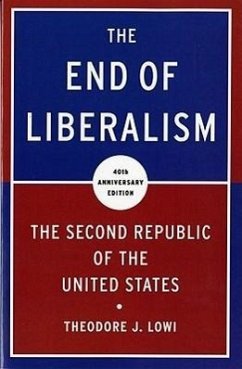The main argument which Lowi develops through this book is that the liberal state grew to its immense size and presence without self-examination and without recognizing that its pattern of growth had problematic consequences. Its engine of growth was delegation. The government expanded by responding to the demands of all major organized interests, by assuming responsibility for programs sought by those interests, and by assigning that responsibility to administrative agencies. Through the process of accommodation, the agencies became captives of the interest groups, a tendency Lowi describes as clientelism. This in turn led to the formulation of new policies which tightened the grip of interest groups on the machinery of government.
Bitte wählen Sie Ihr Anliegen aus.
Rechnungen
Retourenschein anfordern
Bestellstatus
Storno








